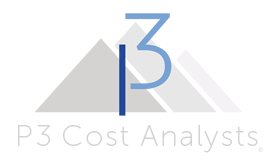Colby Ezell, CFA
CFO | P3 Cost Analysts

- B.A. in Finance from the University of Arkansas
- Chartered Financial Analyst (CFA)
Colby currently serves as P3’s Chief Financial Officer, and is a partner in the firm. Additionally, over the past decade with P3, Colby has led cost reduction audits for over 100 clients.
Prior to joining P3 Colby was an Associate at RGL Advisors. At RGL he focused on the practical application of financial, economic, and valuation principles to solve a variety of client challenges. The scope of his work included financial, economic, and valuation analyses for mergers & acquisitions, corporate strategy, and the valuation of assets and securities for financial reporting.
Colby also previously worked as a National Investment Consultant with the retail brokerage firm TD Ameritrade (now Charles Schwab), where he advised high-net-worth clients on investment portfolios and recommended strategies and solutions to help achieve investment goals and objectives.
Colby resides in Northwest Arkansas with his wife, Susan, and two children (Camden and Charlotte). He enjoys golfing, mountain biking, and traveling with his family.
Q & A with Colby
I was actually working at a boutique investment banking firm in Dallas. I really liked the industry and thought cost reduction would be in high demand in just about any economy. There was an opportunity to buy into P3 and become a partner, so I took a chance.
I would say that it’s a great career to get into. It’s not going anywhere. People are always going to be looking for ways to save money.
More and more companies are realizing that it’s ok to hire outside experts. 10 years ago there was more of a stigma around hiring an expert to help. It was almost like it was an ‘indictment’ of you or your team’s ability.
Now more and more decision makers are employing outside resources and keeping them and their teams laser-focused on their core competencies. When both entities focus on what they do best, everyone wins.
As the CFO I get to see the savings reports (which also double as our invoice for our portion of savings) go out each month to our clients. There really isn’t any one category on its own that has the biggest opportunity. The areas of savings just depend on what types of clients we onboard that month, and what categories are most relevant to their business that we audit.
So if we signed a bunch of manufacturing in one month, the categories we find savings in will vary from a month we sign a bunch of restaurant clients (and of course some months the client mix is very similar).
The most rewarding part of it for me is the numbers aspect. I’m a CFA (Certified Financial Analyst) Charterholder, and one of those weird people that really enjoys analytics and numbers.
At its core, that’s what we do. We are analyzing invoices and contracts, filled with numbers (and terms) that have a massive impact on our clients. So we get to go in there, dig deep, and find ways to reduce those expenses.
And while I’m not the category expert getting the deepest on the analysis, I get to see the numbers, the results, everything that went into it and manage the team that puts together the reports and then see those numbers actually hitting our client’s bottom line when those new invoices come out.
It’s all numbers, and they always tell a story.


